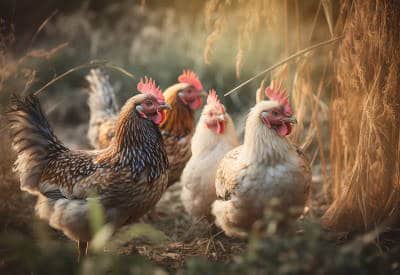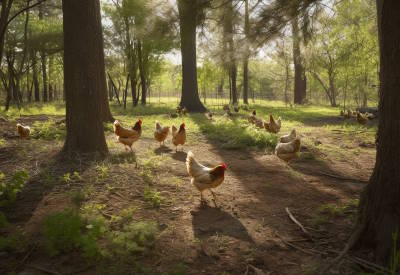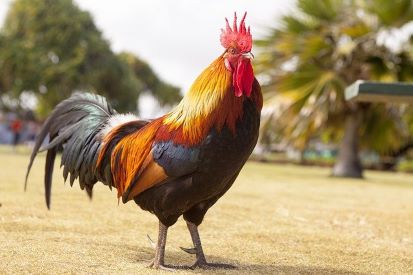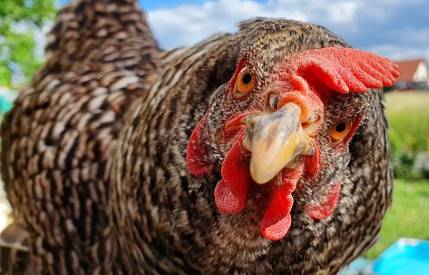Do chickens eat lizards? It’s a question that might surprise many, but the answer is yes, they do. Chickens, known for their egg-laying prowess, also have a less recognized but equally fascinating trait – they’re opportunistic omnivores. Their diet, while largely consisting of grains, plants, and insects, can sometimes include small reptiles like lizards.
My time spent caring for and observing chickens brought this surprising behavior to light. The chickens in my care were not just passive foragers but active hunters, tracking down and consuming lizards that ventured into their territory. This discovery spurred me to understand more about this unusual aspect of chicken behavior.
In this article, we’ll delve into the predatory behavior of chickens, focusing particularly on their interactions with lizards. We’ll explore the factors influencing these interactions, the biology of lizards, and the potential health implications for chickens. This knowledge will help us better understand and manage our chickens’ dietary habits and overall well-being.

Understanding Chickens’ Predatory Behavior
In the world of poultry, chickens are intriguing creatures. Known primarily for their egg-laying ability, there’s more to these birds than what meets the eye. Believe it or not, chickens exhibit predatory behavior. Let’s delve into the world of chickens as hunters.
Overview of Chickens as Omnivores
Let’s start by saying that chickens aren’t the simple herbivores some might think them to be. They’re omnivores with a diet spanning grains, plants, and insects. They are also quite opportunistic.
When allowed to free range, chickens will often go on the hunt, searching for anything of nutritional value. They’re keen on small bugs, seeds, and even rodents and reptiles.
Chickens and Their Hunting Instincts
Just like cats pounce on mice, chickens, too, have their own hunting style. Their sharp eyes can spot the tiniest movement on the ground. When a potential meal is sighted, they’ll stalk, peck, or scratch the earth to capture prey.
Chickens are surprisingly agile and have a quick strike, helping them catch a variety of insects and small creatures.
How Chickens Capture and Consume Prey
Once they’ve secured their prey, chickens have a rather straightforward approach to consumption. They don’t fuss about with careful nibbling or chewing. Instead, they simply toss the creature into the air, catch it in their beak, and swallow it whole. It’s all done in a flash, so don’t blink!
[ChickenAffiliate]
Chickens and Lizards: An Uncommon Encounter
One interesting aspect of chickens’ omnivorous nature is their occasional interactions with reptiles like lizards. These encounters might be less common than their pursuit of insects and worms, but they are no less fascinating. Let’s show how, when, and why chickens may have a run-in with lizards.
How Often Chickens Encounter Lizards in Their Environment
The frequency of chickens encountering lizards depends on the environment. Chickens living in warmer climates or near wooded areas are likelier to cross paths with these reptiles. Given their size and movement, lizards can be a tempting catch for a chicken.
Factors That Influence Chickens to Hunt Lizards
Survival instincts drive chickens, and hunting lizards can be seen as part of their opportunistic feeding habits. Lizards are high in protein and a good source of nutrients, making them a nutritious meal option for chickens, especially when other food sources are scarce.
Anecdotes and Evidence of Chickens Eating Lizards
There are plenty of anecdotes from chicken owners who have witnessed their feathered friends hunting down and gobbling up lizards. Some even have photographic evidence of these hunting escapades. While it’s not an everyday occurrence, it’s certainly not a rarity in the right environments.
The Biology of Lizards: An Overview

Understanding chickens’ interactions with lizards requires a basic understanding of the biology of lizards. After all, to assess the safety and implications of these encounters, we need to know a bit about these small reptiles. Let’s explore the world of lizards.
Common Types of Lizards That Chickens Might Encounter
Chickens might encounter a variety of lizards, from tiny geckos to larger skinks, depending on their location. Some lizards are more likely to venture into chicken territory due to their size, habitat preferences, or simply because they’re more common in that area.
Defensive Mechanisms of Lizards
Lizards are equipped with various defensive mechanisms to escape predators, including chickens. Some can camouflage with their surroundings, while others might play dead to avoid capture. Certain lizards can even lose their tails to escape a tight grip!
Health Implications: Are Lizards Safe for Chickens to Eat?
While lizards can be a good source of protein for chickens, they may also carry parasites or diseases that can be harmful. This is especially true if the lizard population in the area is not healthy.
Impact on Chicken Health: Consuming Lizards

Eating lizards can have positive and negative impacts on a chicken’s health. While lizards can offer a good source of protein, they may also carry diseases or parasites that can harm chickens. It’s important to understand these potential risks when considering the implications of chickens eating lizards.
Nutritional Value of Lizards for Chickens
Lizards can provide a substantial protein boost for chickens. However, they should not be relied upon as a primary food source. Chickens need a balanced diet to stay healthy, and an over-reliance on any one food type can lead to nutritional deficiencies.
Potential Hazards: Parasites and Diseases from Lizards
Lizards may carry parasites or diseases that can harm chickens if consumed. Parasites like worms could infest the chicken’s digestive system, while certain diseases could cause sickness or even death.
Signs of Health Problems in Chickens After Eating Lizards
If a chicken eats an infected lizard, it might show signs of illness, such as a decrease in egg production, lethargy, weight loss, or changes in behavior. In such cases, it’s important to seek veterinary advice immediately.
Chickens and Lizards in Different Geographical Regions

The encounters between chickens and lizards can vary significantly depending on the geographical region. From the tropics to arid regions, the dynamics of these interactions change based on the local climate, types of lizards, and chicken rearing practices. Let’s take a geographical tour of these uncommon encounters.
Chickens and Lizards in the Tropics
In the tropics, there are lizards in abundance, making encounters with chickens more frequent. Chickens here may have a higher intake of lizards due to their abundance. Additionally, the wide variety of lizard species in the tropics introduces an added element of variability regarding potential health impacts.
Chickens and Lizards in Temperate Regions
In temperate regions, the diversity and population of lizards are typically lower. Therefore, the chance of chickens hunting and consuming lizards is reduced. The types of lizards in these areas are also generally less exotic, with a lower risk of carrying harmful parasites or diseases.
Chickens and Lizards in Arid Regions
In arid regions, chickens might encounter lizards like geckos, which have adapted to these harsh conditions. While these encounters can be infrequent due to the scarcity of resources, the survival instinct can drive chickens to hunt lizards when other food sources are scarce.
Managing Your Chickens’ Interactions with Lizards

As chicken owners, we are responsible for the well-being of our birds. This includes managing their diet and interactions with other creatures, including lizards. So, how can we prevent our chickens from eating lizards, and how do we ensure their health if they do? Let’s explore some strategies.
Strategies for Preventing Chickens from Eating Lizards
If you’re concerned about your chickens consuming lizards, there are a few strategies you can employ. You could use fencing or netting to prevent lizards from entering the chicken run or provide ample nutritious food for your chickens to deter them from hunting.
Providing a Balanced Diet: Ensuring Your Chickens Don’t Rely on Lizards
Ensuring that your chickens have a balanced diet is crucial. This includes a mix of grains, fruits, vegetables, and quality commercial feed. This will keep them healthy and lessen their need to supplement their diet with creatures like lizards.
Monitoring Chickens’ Health After a Lizard Encounter
Lastly, be vigilant about your chickens’ health if they’ve eaten a lizard. Look for signs of illness, and don’t hesitate to consult a vet if you’re concerned. Remember, while chickens are hardy creatures, they still rely on us to keep their environment safe and their diet balanced.
What Else Do Chickens Eat Apart from Lizards?

Beyond lizards, chickens have a varied diet that includes other surprising items. Their omnivorous nature drives them to consume an array of foods, some of which may startle us. Let’s explore a few such items and understand whether these are good for chickens to consume.
Mice
Chickens occasionally catch and eat mice, especially if their natural feed is scarce. Mice provide a high-protein meal, but like lizards, they can carry diseases and parasites. While it’s not harmful to chickens to eat mice occasionally, regular consumption could pose health risks.
Read More: Do Chickens Eat Mice? Unveiling The Surprising Truth
Scorpions
Chickens will readily eat scorpions when available. It might be surprising, considering the sting of a scorpion, but chickens seem unbothered by it. Scorpions are another protein-rich snack for chickens, but owners should ensure they don’t become reliant on such foods.
Read More: Do Chickens Eat Scorpions? An Unexpected Food Chain Link
Frogs
Chickens are known to snatch up small frogs if they come across them. Frogs can be a good source of nutrition for chickens, providing protein and moisture. However, some frog species produce toxins that can harm chickens, so caution is necessary.
Read More: Do Chickens Eat Frogs? Unraveling The Surprising Truth
Snakes
Chickens may go after small snakes, especially when in groups. Snakes, like other live prey, provide a good source of protein. However, certain snakes are venomous and can threaten chickens, both as prey and as predators.
Read More: Do Chickens Eat Snakes? Unveiling The Truth Behind The Myth
Their Own Poop
Chickens might peck at their own feces out of curiosity or due to nutrient deficiencies. This behavior, known as coprophagy, is generally unhealthy and can lead to the spread of diseases. Maintaining clean living conditions for chickens and providing them with a balanced diet is essential to discourage this behavior.
Read More: Do Chickens Eat Their Own Poop? Unearthing The Truth
Do chickens eat lizards – final thoughts
In wrapping up our exploration, we’ve confirmed that chickens, as opportunistic omnivores, do eat lizards under certain circumstances. Their hunting behavior is driven by environmental factors and survival instincts, with lizards providing a protein-rich meal. Yet, this interaction poses potential health risks due to parasites and diseases that lizards might carry.
While the frequency and dynamics of these encounters vary based on geographical region, the bottom line remains the same: we need to ensure the health and safety of our chickens. This entails a balanced diet, proactive management of their interactions with lizards, and vigilance for signs of health problems. Therefore, the answer to “do chickens eat lizards” is a yes, but with precautions in mind to safeguard our poultry’s health.
